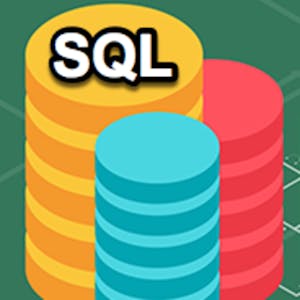Databases and SQL for Data Science with Python
Much of the world’s data resides in databases. SQL (or Structured Query Language) is a powerful language which is used for communicating with and extracting data from databases. A working knowledge of databases and SQL is a must if you want to become a data scientist.The purpose of this course is to introduce relational database concepts and help you learn and apply foundational knowledge of the SQL language. It is also intended to get you started with performing SQL access in a data science environment.
The emphasis in this course is on hands-on and practical learning . As such, you will work with real databases, real data science tools, and real-world datasets. You will create a database instance in the cloud. Through a series of hands-on labs you will practice building and running SQL queries. You will also learn how to access databases from Jupyter notebooks using SQL and Python.
No prior knowledge of databases, SQL, Python, or programming is required.
Anyone can audit this course at no-charge. If you choose to take this course and earn the Coursera course certificate, you can also earn an IBM digital badge upon successful completion of the course.
LIMITED TIME OFFER: Subscription is only $39 USD per month for access to graded materials and a certificate.
Analyze data within a database using SQL and Python.
Create a relational database on Cloud and work with tables.
Compare and contrast DDL to DML.
Write SQL statements including SELECT, INSERT, UPDATE, and DELETE.
Syllabus
Syllabus - What you will learn from this course
Week 1
Getting Started with SQL
Week 2
Introduction to Relational Databases and Tables
Week 3
Intermediate SQL
Week 4
Accessing Databases using Python
Week 5
Course Assignment
Week 6
Bonus Module: Advanced SQL for Data Engineering (Honors)
In this module, you will be introduced to databases. You will create a database instance on the cloud. You will learn some of the basic SQL statements. You will also write and practice basic SQL hands-on on a live database.
FAQ
When will I have access to the lectures and assignments?
Access to lectures and assignments depends on your type of enrollment. If you take a course in audit mode, you will be able to see most course materials for free. To access graded assignments and to earn a Certificate, you will need to purchase the Certificate experience, during or after your audit. If you don't see the audit option:
What will I get if I subscribe to this Certificate?
When you enroll in the course, you get access to all of the courses in the Certificate, and you earn a certificate when you complete the work. Your electronic Certificate will be added to your Accomplishments page - from there, you can print your Certificate or add it to your LinkedIn profile. If you only want to read and view the course content, you can audit the course for free.
Reviews
One of the best course I completed on Coursera. All the learning material is well organised and easy to understand. Also the non-graded sections regarding relational databases are interesting.
Amazing course for beginners! The entire course is well structured and has good hands-on assignments. SQL is extremely essential for Database management and fun learning so please do try this one out!
Much important instruction was missing which lead to a delay in submission of the peer assignment. Various errors popped up which had no solution in the discussion forum also. Kindly look into it.
Great introduction to basic manipulation of SQL tables and working with the IBM DB2 databases by connecting to them with iPython. Very straightforward explanations and very enjoyable tasks.
